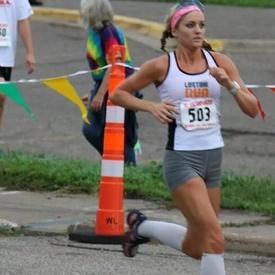We are pleased to announce that as of March 4, 2025, an updated Rich Text Editor has been introduced in the MyFitnessPal Community. To learn more about the changes, please click here. We look forward to sharing this new feature with you!
Racing post-injury

vmclach
Posts: 670 Member
How long do you wait to "race" again after getting the doctors okay? I've been unable to run over 40 min for the past 12 weeks due to tendonosis in my quad. Granted, I didn't see the doctor regularly like I should have until week 10, but My doctor recently told me I could go ahead and start running long again. I have been able to run 2 runs over 60 min in the past week without pain. Now, he thinks I'm "good to go". I am pretty bummed that I wasn't able to run my goal fall marathon (Chicago), and I would like to run a half before winter comes. He think I'd be fine to race a 1/2. Does this sound like a bad idea? I'm paranoid of getting injured again.
0
Replies
-
So you suffered an injury three months ago and it isn't fully recovered? That sucks. Any idea what caused it? Was it an acute or chronic injury? Obviously, you don't want to do the very thing too soon that caused the injury in the first place.0
-
So... it's ok to give you advice now?0
-
So what caused the injury in the first place, was it racing?0
-
0
-
I'm thinking that slowing the *kitten* down, and not running 3 or 4 times a day should help. But what do I know, my PRs are nowhere near yours.
And... the Doc told you that you are good to race, but you are questioning it? Why? It's not like you usually listen to the Doc...0 -
What kind of doctor was this? that will say a lot. A sports medicine specialist that understands distance running and your local PCP are two different things, kwim?0
-
Training2BeFast wrote: »I'm thinking that slowing the *kitten* down, and not running 3 or 4 times a day should help. But what do I know, my PRs are nowhere near yours.
And... the Doc told you that you are good to race, but you are questioning it? Why? It's not like you usually listen to the Doc...
^^ THIS.0 -
 0
0 -
I think you'd be fine to race it. Heck, I'd go for a PR. You can do it. I believe in you. Make sure you run plenty between now and then. Don't listen to the haterz.
 0
0 -
jofjltncb6 wrote: »So you suffered an injury three months ago and it isn't fully recovered? That sucks. Any idea what caused it? Was it an acute or chronic injury? Obviously, you don't want to do the very thing too soon that caused the injury in the first place.
Chronic.. Likely overtraining. It flared up a week after my last full which had a 1400 ft elevation change was tough on my quads, and I don't think I recovered properly!0 -
Training2BeFast wrote: »I'm thinking that slowing the *kitten* down, and not running 3 or 4 times a day should help. But what do I know, my PRs are nowhere near yours.
And... the Doc told you that you are good to race, but you are questioning it? Why? It's not like you usually listen to the Doc...
Taper getting to you?
0 -
I think it was caused from my last marathon which a big elevation change putting a lot of extra pressure on my quads & not recovering properly.0 -
Carrieendar wrote: »What kind of doctor was this? that will say a lot. A sports medicine specialist that understands distance running and your local PCP are two different things, kwim?
Sports medicine. He has been doing a lot of ART. He sees a lot of runners. I am just surprised that moving my leg around doing ART has magically healed me in 2 weeks.0 -
I think it was caused from my last marathon which a big elevation change putting a lot of extra pressure on my quads & not recovering properly.
You should properly look into how to recover properly and take breaks instead of running multiple times a day.0 -
I think it was caused from my last marathon which a big elevation change putting a lot of extra pressure on my quads & not recovering properly.
You should properly look into how to recover properly and take breaks instead of running multiple times a day.
logic like that will not be tolerated around here.0 -
was the doctor unable to pinpoint cause? that's usually integral to healing in an athlete. he gave you a diagnosis of -osis, so the body is not reacting to inflammation, which means the microtears are essentially being integrated into the tissue, that matrix of the tendon itself is changing.
I am not a doctor (in training to go RN to PA), but, I have done some work alongside sports medicine doctors, and this type of injury is usually healed by rest and gradual return or else you risk needing surgery to remove the irregular tissue that you continue to create by re-injuring the area.
So...long story short, I would make sure the doctor understands long distance, how racing differs from training/just running, and all that.0 -
AllonsYtotheTardis wrote: »
I think it was caused from my last marathon which a big elevation change putting a lot of extra pressure on my quads & not recovering properly.
You should properly look into how to recover properly and take breaks instead of running multiple times a day.
logic like that will not be tolerated around here.
probably not
0 -
Carrieendar wrote: »was the doctor unable to pinpoint cause? that's usually integral to healing in an athlete. he gave you a diagnosis of -osis, so the body is not reacting to inflammation, which means the microtears are essentially being integrated into the tissue, that matrix of the tendon itself is changing.
I am not a doctor (in training to go RN to PA), but, I have done some work alongside sports medicine doctors, and this type of injury is usually healed by rest and gradual return or else you risk needing surgery to remove the irregular tissue that you continue to create by re-injuring the area.
So...long story short, I would make sure the doctor understands long distance, how racing differs from training/just running, and all that.
He sees a lot of runners. He is a competitive runner himself. He told me it occurred overtime because of all the marathons. He said that it's pretty common.. However, he at no point during this process told me to rest or take time off... In fact he actually told me that running 2x a day shorter distance would be a good idea.. And he also said that running faster is better because your turnover is faster or something. He seemed to think putting stress on it would help rebuild it. I'm not doctor not do I have any medicinal background, so I don't really know much about it except what he has told me
0 -
Carrieendar wrote: »was the doctor unable to pinpoint cause? that's usually integral to healing in an athlete. he gave you a diagnosis of -osis, so the body is not reacting to inflammation, which means the microtears are essentially being integrated into the tissue, that matrix of the tendon itself is changing.
I am not a doctor (in training to go RN to PA), but, I have done some work alongside sports medicine doctors, and this type of injury is usually healed by rest and gradual return or else you risk needing surgery to remove the irregular tissue that you continue to create by re-injuring the area.
So...long story short, I would make sure the doctor understands long distance, how racing differs from training/just running, and all that.
He sees a lot of runners. He is a competitive runner himself. He told me it occurred overtime because of all the marathons. He said that it's pretty common.. However, he at no point during this process told me to rest or take time off... In fact he actually told me that running 2x a day shorter distance would be a good idea.. And he also said that running faster is better because your turnover is faster or something. He seemed to think putting stress on it would help rebuild it. I'm not doctor not do I have any medicinal background, so I don't really know much about it except what he has told me
A second opinion is always possible.
That's what I did with my knee. And my ankle. Ended up the best thing I did for myself since I can run without knee pain now
0 -
Carrieendar wrote: »was the doctor unable to pinpoint cause? that's usually integral to healing in an athlete. he gave you a diagnosis of -osis, so the body is not reacting to inflammation, which means the microtears are essentially being integrated into the tissue, that matrix of the tendon itself is changing.
I am not a doctor (in training to go RN to PA), but, I have done some work alongside sports medicine doctors, and this type of injury is usually healed by rest and gradual return or else you risk needing surgery to remove the irregular tissue that you continue to create by re-injuring the area.
So...long story short, I would make sure the doctor understands long distance, how racing differs from training/just running, and all that.
He sees a lot of runners. He is a competitive runner himself. He told me it occurred overtime because of all the marathons. He said that it's pretty common.. However, he at no point during this process told me to rest or take time off... In fact he actually told me that running 2x a day shorter distance would be a good idea.. And he also said that running faster is better because your turnover is faster or something. He seemed to think putting stress on it would help rebuild it. I'm not doctor not do I have any medicinal background, so I don't really know much about it except what he has told me
A second opinion is always possible.
That's what I did with my knee. And my ankle. Ended up the best thing I did for myself since I can run without knee pain now
I don't have pain anymore, but if it comes back in a few weeks, I suppose that would be a good idea.
0 -
Carrieendar wrote: »was the doctor unable to pinpoint cause? that's usually integral to healing in an athlete. he gave you a diagnosis of -osis, so the body is not reacting to inflammation, which means the microtears are essentially being integrated into the tissue, that matrix of the tendon itself is changing.
I am not a doctor (in training to go RN to PA), but, I have done some work alongside sports medicine doctors, and this type of injury is usually healed by rest and gradual return or else you risk needing surgery to remove the irregular tissue that you continue to create by re-injuring the area.
So...long story short, I would make sure the doctor understands long distance, how racing differs from training/just running, and all that.
He sees a lot of runners. He is a competitive runner himself. He told me it occurred overtime because of all the marathons. He said that it's pretty common.. However, he at no point during this process told me to rest or take time off... In fact he actually told me that running 2x a day shorter distance would be a good idea.. And he also said that running faster is better because your turnover is faster or something. He seemed to think putting stress on it would help rebuild it. I'm not doctor not do I have any medicinal background, so I don't really know much about it except what he has told me
This is actually the SOP for ART providers. Continue to run during treatment and watch for the improvements.
0 -
CarsonRuns wrote: »Carrieendar wrote: »was the doctor unable to pinpoint cause? that's usually integral to healing in an athlete. he gave you a diagnosis of -osis, so the body is not reacting to inflammation, which means the microtears are essentially being integrated into the tissue, that matrix of the tendon itself is changing.
I am not a doctor (in training to go RN to PA), but, I have done some work alongside sports medicine doctors, and this type of injury is usually healed by rest and gradual return or else you risk needing surgery to remove the irregular tissue that you continue to create by re-injuring the area.
So...long story short, I would make sure the doctor understands long distance, how racing differs from training/just running, and all that.
He sees a lot of runners. He is a competitive runner himself. He told me it occurred overtime because of all the marathons. He said that it's pretty common.. However, he at no point during this process told me to rest or take time off... In fact he actually told me that running 2x a day shorter distance would be a good idea.. And he also said that running faster is better because your turnover is faster or something. He seemed to think putting stress on it would help rebuild it. I'm not doctor not do I have any medicinal background, so I don't really know much about it except what he has told me
This is actually the SOP for ART providers. Continue to run during treatment and watch for the improvements.
That's good to know. I hope that it is actually healed/healing instead of just masking some internal problem only to come back again :-/0 -
I guess I just cant wrap my mind around a diagnosis like that coupled with the advice to run more often, faster. If it was tendonitis, yes, I can understand that. But, when you diagnose as OSIS, you are saying "the tendon's collagen is changing." the collagen is degenerating.0
-
-
Carrieendar wrote: »I guess I just cant wrap my mind around a diagnosis like that coupled with the advice to run more often, faster. If it was tendonitis, yes, I can understand that. But, when you diagnose as OSIS, you are saying "the tendon's collagen is changing." the collagen is degenerating.
You are assuming an accurate diagnosis of the tissue. Many practitioners will through an -itis on any soft tissue injury where some inflammation is present. This could be more of an inflammation of the tissue surrounding the tendon, not the tendon itself.
0 -
true..very true.0
-
Carrieendar wrote: »I guess I just cant wrap my mind around a diagnosis like that coupled with the advice to run more often, faster. If it was tendonitis, yes, I can understand that. But, when you diagnose as OSIS, you are saying "the tendon's collagen is changing." the collagen is degenerating.
When he told me it was tendonosis, I said "I've never heard of that before. What's the difference between that and tendonitous?"
He said : "tendonitous is an acute injury.. So it could be that you were doing 400s on a track, and the next day you can't walk.. It usually comes on really quickly and the muscle is really inflamed... Tendonosis is more gradual over time. It's not an inflammation of the tendon. So don't take IB profin or ice because it's not inflamed. Your tendon actually has (I really don't remember this part- but I think it was the micro tear thing..). He said that he was going to stress it "just enough" to break down the tendon to rebuild & regrow to be healthy again".... Something along those lines. He says is actually really common in distance runners. I couldn't find much about it online, so I just kinda took his word for it.0 -
i guess i thought that was where the gradual return thing comes in; you slowly build up to encourage the tendon fibers to enlongate as they go through the 100 day cycle of regeneration or whatever it is in that particular area.0
-
Carrieendar wrote: »i guess i thought that was where the gradual return thing comes in; you slowly build up to encourage the tendon fibers to enlongate as they go through the 100 day cycle of regeneration or whatever it is in that particular area.
Lol I just found an article online about itis vs osis... Doesn't exactly sound like what he described, but I see points that sound similar. I don't know really. He said that because of my young age & physical condition that the fibers will regrow a lot faster (like a week)? He kept comparing me to an old inactive person. He said my body will be able to adapt faster because I'm "in shape"?0 -
I totally missed the osis part.Carrieendar wrote: »I guess I just cant wrap my mind around a diagnosis like that coupled with the advice to run more often, faster. If it was tendonitis, yes, I can understand that. But, when you diagnose as OSIS, you are saying "the tendon's collagen is changing." the collagen is degenerating.
When he told me it was tendonosis, I said "I've never heard of that before. What's the difference between that and tendonitous?"
He said : "tendonitous is an acute injury.. So it could be that you were doing 400s on a track, and the next day you can't walk.. It usually comes on really quickly and the muscle is really inflamed... Tendonosis is more gradual over time. It's not an inflammation of the tendon. So don't take IB profin or ice because it's not inflamed. Your tendon actually has (I really don't remember this part- but I think it was the micro tear thing..). He said that he was going to stress it "just enough" to break down the tendon to rebuild & regrow to be healthy again".... Something along those lines. He says is actually really common in distance runners. I couldn't find much about it online, so I just kinda took his word for it.
0
This discussion has been closed.









